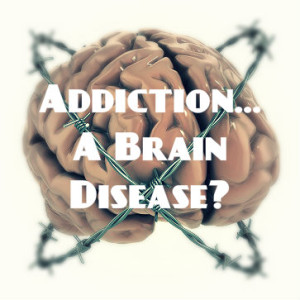16 Jul 2014
Is Addiction A Brain Disease?
The nature of addiction has been debated for decades. The prevailing current view is that addiction is not a choice; it’s a chronic illness that affects the brain. Some, however, even addiction experts, reject this categorization and insist that addiction is a rational choice. There are dangers on both sides. Defining addiction as a disease may give addicts a sense of hopelessness and lack of control. Blaming addicts for their choices, on the other hand, results in stigma and shame.
When coping with a loved one who is addicted, it is important to understand what the research really tells us. While there is still room for debate, the evidence is overwhelming that addicts have a chronic brain disease. By better understanding how drugs or alcohol have changed a loved one’s brain, you may be able to find the patience and compassion to help him.
Addiction Defined
 Modern research has uncovered some of the secrets of addiction. Those at the forefront of addiction expertise and treatment follow evidence-based practices and learn from medical research. With that in mind, the American Society of Addiction Medicine defines addiction as “a primary, chronic disease of brain reward, motivation, memory, and related circuitry.” In other words, to the best knowledge of those who study and treat addiction, addiction is a disease of the brain.
Modern research has uncovered some of the secrets of addiction. Those at the forefront of addiction expertise and treatment follow evidence-based practices and learn from medical research. With that in mind, the American Society of Addiction Medicine defines addiction as “a primary, chronic disease of brain reward, motivation, memory, and related circuitry.” In other words, to the best knowledge of those who study and treat addiction, addiction is a disease of the brain.
How Drugs Affect The Brain
If addiction is a disease of the brain, what exactly does that mean? It is easy to comprehend what a disease is. For instance, asthma is a disease that affects the respiratory system. Inflamed airways make it difficult to breathe. The right medications, avoiding triggers, and following a doctor’s orders all help asthma sufferers stay well and breathe with less difficulty.
Addiction is a disease that affects the brain. The initial use of drugs is a choice, but once in the bloodstream, drugs get into the brain and start to cause changes that impact mood and behavior. The first thing that happens when someone takes a drug is that cells in the brain release large quantities of a chemical called dopamine, which gives the user a sense of euphoria. That great feeling encourages subsequent and repeated drug use in order to recapture the euphoria.
Drugs also impact parts of the brain related to memory and self-control. Memories of taking a drug can make the user start to crave it again and again. The way in which drugs affect our control mechanisms in the brain mean that a user’s ability to resist cravings becomes severely impaired. These brain changes caused by drugs and alcohol clearly demonstrate that addiction is far more complex than making choices.
How Is Addiction Chronic?
As you cope with helping a loved one struggling to get into recovery, it is also important to understand the chronic nature of the disease. This means that there is no cure for the disease, only treatments. Like any other chronic illness, addiction is life-long. Relapses are not uncommon, but can be minimized by keeping up with treatments and establishing and maintaining a strong support system. In fact, research shows that rates of relapse among addicts are similar to those among people with other chronic diseases, like asthma.
Watching a loved one’s struggle with addiction is heartbreaking and frustrating. From the outside looking in, it can be difficult to understand why he doesn’t just stop using drugs. The more you understand his disease, that it impacts his brain and is chronic, the better able you will be to help him and to remain positive and patient with him as he gets treatment.
Read Our Other Posts For Friends And Family Of Addicts
20 Jun 2014
Do Genes Equal Destiny In Addiction?
We know that genes play a role in the development of addiction. No single gene determines whether a person will become addicted to drugs or alcohol because addiction is a complex and chronic disease. There are multiple genes that influence addiction, and environment plays a role as well. We know that genes are important because the number one risk factor for predicting addiction is family history. If you have a family history of addiction, you probably have some of the influencing genes. This does not mean that you are destined to become an alcoholic or a drug addict. It does mean, however, that you need to be aware and careful.
Addiction Is A Complex Disease
 Addiction is not a simple matter of one gene causing the disease. It is also not as simple as defining anyone with a family history of addiction as an addict or future addict. There are so many factors, both genetic and environmental, that influence addiction that it may never be possible to accurately predict if someone will develop an addiction. Because family history is such a strong risk factor, we can be sure that genetics play some role.
Addiction is not a simple matter of one gene causing the disease. It is also not as simple as defining anyone with a family history of addiction as an addict or future addict. There are so many factors, both genetic and environmental, that influence addiction that it may never be possible to accurately predict if someone will develop an addiction. Because family history is such a strong risk factor, we can be sure that genetics play some role.
Those without a family history of addiction may also develop addiction. This shows that environment plays a role as well. Experiencing childhood trauma, such as abuse, or having a mental illness can influence the development of addiction. Still, just because there is a family history of addiction or a personal experience of negative environmental factors does not mean you targeted or marked for life. You still have choices to make about abusing substances.
What If I Have A Family History of Addiction?
With a family history of addiction, you may be carrying some genes that could make you more susceptible to addiction. Remember, though, that drinking or using a drug for the first time is a choice you make. Once you have tried them, you may be more likely than the average person to become addicted, but you never have to take that first step. Genes do not push you to try illegal drugs or to get drunk.
If you are worried about becoming an addict, there are some important steps you can take:
- Abstain -The first and most important thing you can do is simply to abstain from drinking at all and from using illegal drugs. If you need to use prescription drugs that are habit-forming, follow your doctor’s instructions regarding dosing and talk to your doctor about addiction concerns.
- Seek counseling – If you have a family history of addiction, someone in your life likely caused you emotional distress, or worse, because of their addiction. Talking about it with a therapist can help you resolve any issues you have regarding this person and can help strengthen your determination to stay sober.
- Choose sober friends – If you have never struggled with addiction yourself you do not necessarily need to stay away from people who drink, but it can help to surround yourself with friends who also choose sobriety. When you spend too much time with people who are drinking or using drugs, they may try to pressure you to join in. You don’t need that extra pressure.
- Develop a healthy lifestyle – A great way to ensure that you don’t need to use drugs or alcohol is to live a life where there’s no room for substance abuse. Develop a strong social life with supportive friends and family. Engage in fulfilling and enjoyable hobbies and activities. Eat regular, well-balanced meals, exercise and stay healthy and you will have no need for substance abuse.
Always remember that genes for addiction are not destiny. You have the power to make choices in your life and to create the kind of life you want to have. By staying positive, surrounding yourself with supportive people and avoiding drugs and alcohol, you will be taking proactive steps that will make it less likely that family history will repeat itself.
Call Us Now If You Or A Loved One Is Struggling With Addiction – We Are Available 24/7!


